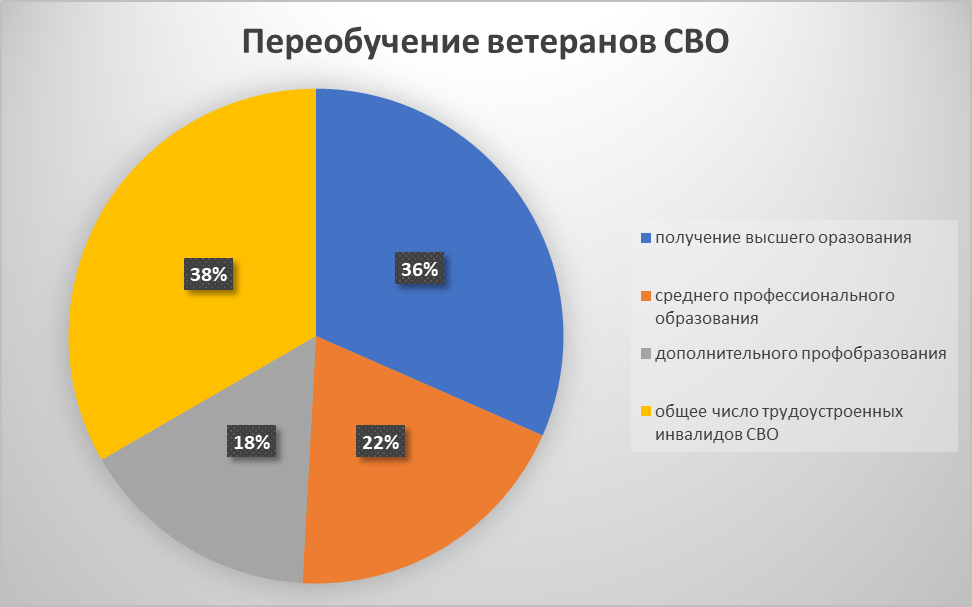What are the Employment Prospects for SMO veterans

On December 18, 2023, an article titled “Return from the front: what are the employment prospects for combat invalids” was published on the website of the Russian edition of PROFIL. The author of the material, Maria Izmailova, refers to statistics from the Ministry of Labor, whose analysts estimate that there are 4.3 million disabled people of working age in Russia. At the same time, only 27% (1.1 million people) are officially employed. According to the article, if everyone worked, the average annual growth rate of Russia’s GDP per capita in 2018-2022 would be 0.5 percentage points higher (1.65% instead of the actual 1.15%).

Our team decided to verify the information regarding the employment of military personnel who were injured while performing tasks during the Special Military Operation (SMO).
We studied the statistics on the employment of disabled people in Russia, analyzed the key provisions of the legislation of the Russian Federation in the field of employment for disabled people and checked the facts of quotas and employment for the years 2024-2025.
Defenders need protection
According to information from Anna Tsivileva, chairman of the Defenders of the Fatherland NGO, Deputy Minister of Defense of the Russian Federation, which is given in the article, 36% of former military personnel are interested in higher education, 22% in secondary vocational education, and 18% in additional professional training (the data are shown in our chart below).
The Fund was able to help 38% of applicants find employment, while the rest were registered and the job selection process continues for them.

These data indicate a significant interest among demobilized military person in improving their qualifications and adapting to civilian life. The fund is actively working to meet these needs by offering a wide range of educational programs and assisting in finding suitable jobs. In the future, it is planned to expand cooperation with educational institutions and employers to increase the percentage of those employed and ensure the successful integration of former military personnel into society. Special attention will be given to an individualized approach to each applicant, taking into account their professional skills, interests, and personal circumstances.
Key Provisions of the Legislation of the Russian Federation in the Field of Employment for Disabled People
In Russia, the reform is being carried out in the field of rehabilitation and employment of disabled people with the aim of implementing the basic principles of the Convention on the Rights of People with Disabilities, adopted by the United Nations General Assembly on December 13, 2006, and effective from May 3, 2008:
|
|
|
|
|
Employment of persons with disabilities, according to the employment agreement specified in paragraph 2 of part 6 of this article, should take place in the territory of the subject of the Russian Federation, at the location of the employer or its branches and representative offices.
Employers are exempt from fulfilling the mandatory quota for hiring people with disabilities only in the following cases:
- If employers represent public associations of disabled people;
- In other cases, determined by the Government of the Russian Federation.
Let’s consider the Federal Law of November 24, 1995, No. 181-FZ “On Social Protection of Disabled People in the Russian Federation.” The Article 21 of this law states that issues related to “quotas” for disabled people are regulated in accordance with the regulatory acts on employment. Let’s present the current situation of employment for disabled people in general, without specifying the reasons for obtaining this status, as the issue of employment and job placement for these citizens in modern society is no less important. Below we provide up-to-date data posted on the website of the Social Fund of Russia (see Figure 1):

About Quotas
To date, the state pays special attention to the issue of returning veterans to civilian life and their employment. This particularly concerns soldiers who became disabled during combat operations.
The table shows changes related to the provision of quotas:
|
Legislation |
Quota size for hiring disabled people
|
|
Federal Law of November 24, 1995 No. 181-FZ No. On the social protection of disabled people in the Russian Federation” Art. 21 |
Number of employees from the average number of personnel: – 35-100 people – no more than 3% – more than 100 people – from 2% to 4% |
|
Federal Law of December 12, 2023 No. 565-FZ “On Employment in the Russian Federation” Article 38 |
For employers with more than 35 employees – from 2 to 4% of the average number of employees. |
Quotas for jobs for the employment of disabled people are mandatory for all enterprises with an average number of employees exceeding 35 people. The number of quota jobs should be 2-4% of the total number of jobs at the enterprise.
When considering the current structure of employment for disabled people, it can be noted that the largest share of them work in sectors such as agriculture and hunting (30%), and manufacturing (12%). It is noteworthy that among the general population, the largest share of workers is employed in trade (16%), manufacturing (14.5%), transport and communications (percentage not specified), and only 6% in agriculture and forestry (table 2).

Table 2. The structure of the employed population aged 15-27 with disabilities, by type of economic activity in their main job, in %
On November 20, 2024, a new version of Article 5.42 of the Administrative Code (Federal Law No. 382-FZ of 11/09/2024) entered into force. From this date, the employer may be punished for not meeting the quota and for refusing to hire a disabled person. The fine is:
- 20,000-30,000 rubles for officials;
- 30,000-50,000 rubles for individual entrepreneurs;
- 50,000-100,000 rubles for legal entities.
In addition, it should be noted that Article 5.42 of the Administrative Code of the Russian Federation does not contain the wording “unmotivated refusal”. That is, theoretically, an employer can be held accountable, even if he does not hire a disabled person due to his non-compliance with the qualification requirements for the position.
The relevance of issues related to employment and employment of persons with disabilities is determined by the importance of developing and improving the relevant legal framework at the regional level. Interdepartmental working groups have been established under administrations in each municipal district to promote the employment of people with disabilities, and monthly meetings are held with the invitation of employers, representatives of medical and social expertise, employment centers, and educational institutions.
In addition, the procedure for interaction and joint work of the employment service, education and institutions of the Bureau of Medical and Social Expertise has been defined. Relevant agreements have been concluded, and a procedure has been signed for cooperation to improve vocational guidance, vocational training, and employment for people with disabilities.
Conclusion
Thus, the study of the regulatory framework and analysis of statistical data allows us to conclude that the state policy is aimed at creating opportunities for SMO veterans to realize themselves in civilian life. Employers must be prepared to purchase specialized equipment and tools that will make the work process more comfortable and accessible. Ultimately, it is precisely a comprehensive approach to this problem that will ensure sustainable employment for people with disabilities. In conclusion, it can be stated that the analyzed statement is “true.”
Authors: Vera Kozhina, Alexander Averin, Alyona Manina.